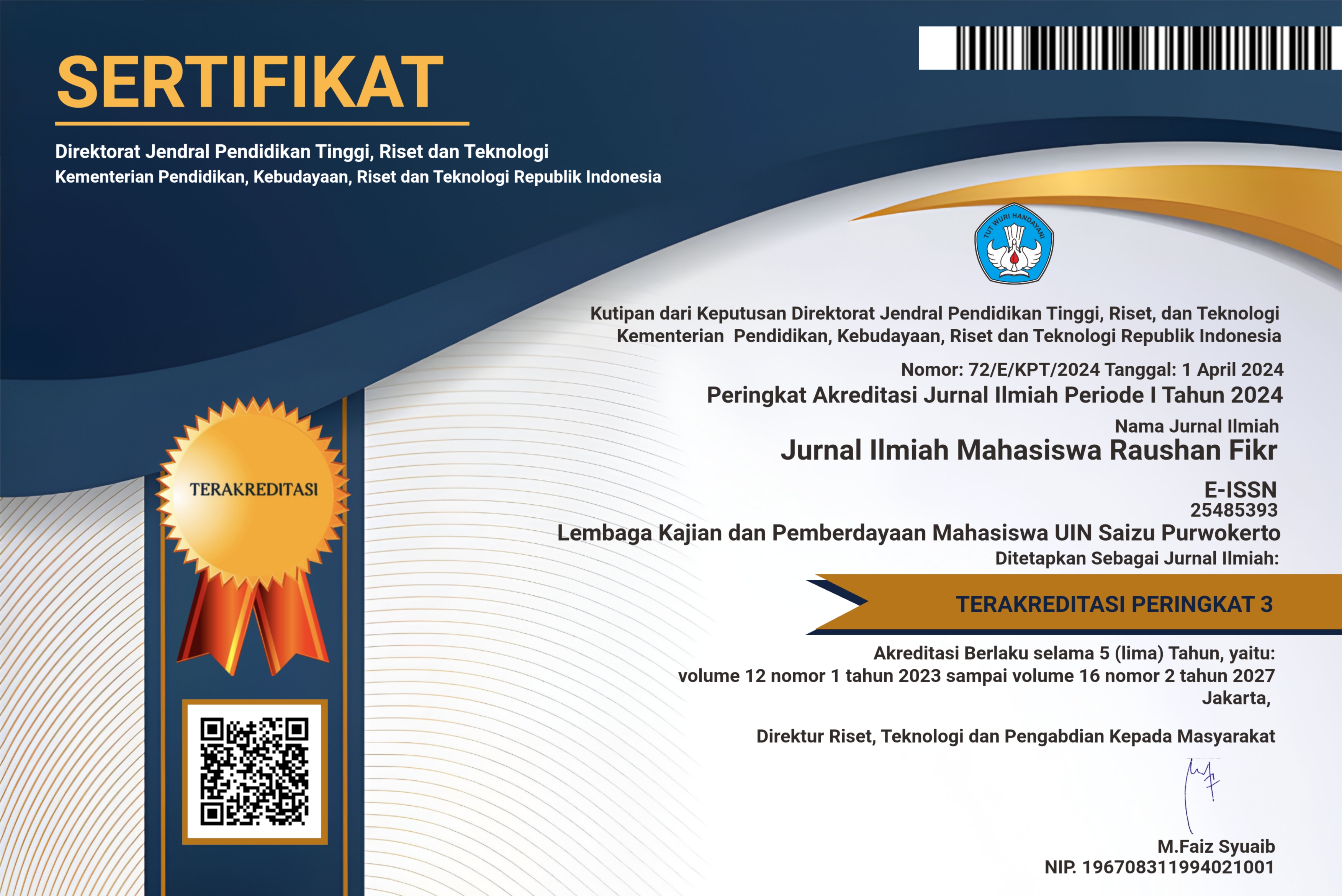Virtue Analysis of Social Forestry in the Public Space Through the Maqashidi Approach
DOI:
https://doi.org/10.24090/jimrf.v11i2.6094Kata Kunci:
Analisa Virtue, Perhutanan Sosial, Tafsir MaqashidiAbstrak
Pemberian hak pemanfaatan hutan oleh pemerintah pusat kepada perusahaan swasta dan negara, pada tahap selanjutnya memunculkan ketimpangan bagi penduduk sekitar hutan. Mereka yang notabene adalah penerima dampak paling awal dari kerusakan ekologi justru tidak mendapat banyak kesempatan untuk ikut andil menikmati sumber daya di sekelilingnya. Tak heran, jika kondisi perekonomian penduduk sekitar masih stag di bawah garis kemiskinan. Kementerian Lingkungan Hidup dan Kehutanan (KLHK) Republik Indonesia kemudian menetapkan satu program, perhutanan sosial (social forestry). Merupakan upaya pemberian akses legal pengelolaan lahan kawasan hutan negara seluas 12,7 juta hektar kepada masyarakat. Berangkat dari hal tersebut, artikel ini hendak mengungkap sejauh mana program perhutanan sosial berdampak positif terhadap lingkungan hidup, baik manusia ataupun alam. Sebagai pisau analisis, tafsir maqashidi Abdul Mustaqim diproyeksikan untuk menggali dimensi maqashidiyah (maqashid al-Qur’an dan maqashid syari’ah) perhutanan sosial dengan merujuk pada beberapa ayat yang berbicara tema terkait. Adapun kesimpulan yang dihasilkan, program perhutanan sosial mampu mewakili dimensi maqashid al-Qur’an pada nilai kebebasan dan tanggung jawab. Pada dimensi maqashid syari’ah, ia cukup kooperatif sebagai upaya hifdz al-nafs (menjaga jiwa) dan hifdz al-bi’ah (menjaga lingkungan)Unduhan
Referensi
Banten, DLH and PP (nd). Perhutanan Sosial. Retrieved November 19, 2021, from https://dlhk.bantenprov.go.id
Bistara, R. (2020). Virtue Ethics Aristoteles dalam Kebijaksanaan Praktis dan Politis Bagi Kepemimpinan Islam: Aqlania, 11, 2.
Cifor. (2003). Warta Kebijakan: Perhutanan Sosial. Cifor, 4.
Ekawati, S. (2020). Bersama Membangun Perhutanan Sosial. IPB Press.
Forclime. (2018). Perhutanan Sosial. 6, 0–3.
Hamka. (1989). Tafsir Al-Azhar, vol. 1. Pustaka Nasional PTE LTD.
Informatics, KK and. (nd). Perhutanan Sosial, Kini Masyarakat Legal Mengelola Hutan. Retrieved November 19, 2021, from https://www.kominfo.go.id/content/detail/10564/perhutanan-social-kini-masyarakat-legal-menelola-hutan/0/article_gpr
Kehutanan, KLH and. (nd-a). Tata Kelola Baru Pelayanan Akses Legal Perhutanan Sosial 4.0. Retrieved November 18, 2021, from Pkps.menlhk.go.id
Kehutanan, KLH and. (nd-b). Tata Kelola Hutan Untuk Kesejahteraan Masyarakat. http://pskl.menlhk.go.id/berita/311-tata-kelola-hutan-untuk-kesejahteraan- Masyarakat.html
Ksdae.menlhk. (nd). Perhutanan Sosial Kemitraan Konservasi Desa Cibuntu Penyangga Gunung Ciremai.
Maiwan, M. (2019). Antara Virtue dan Fortune: Suatu Dimensi dalam Pemikiran Machiavelli: Jurnal Ilmiah Mimbar Demokrasi, 19, 1.
Mustaqim, A. (2019). Argumentasi Keniscayaan Tafsir Maqashidi sebagai Basis Moderasi Islam. UIN Sunan Kalijaga.
Mustaqim, A. (2021a). Online Lecture on Tafsir Maqashidi Meeting 1: Definition, Purpose, and Significance. LSQ TV.
Mustaqim, A. (2021b). Postgraduate Public Lecture on Quran Studies in the Perspective of Tafsir Maqashidi Prof. Dr. H. Abdul Mustaqim. Institute of Qur’anic Sciences.
Nabillah, FA (2021). Konstruksi Pemikiran Tafsir Maqashidi K.H. Abdul Mustaqim. UIN Sunan Kalijaga.
Qutb, S. (1992). Tafsir Fi Zhilalil Qur’an: Di Bawah Naungan Al-Qur’an, Volume 1, Trans. As’ad Yasin, et al. Gema Insani.
Rakhman, O. et al. (2019). Studi Efektivitas Implementasi Kebijakan Perhutanan Sosial Buku WALHI Selama Periode Pemerintahan Jokowi – Jusuf Kalla (1st ed.). Walhi.
RI, KA (2011). Al-Qur’an dan Tafsirnya. Widya Cahaya.
Rifqi, MA, & Thahir, AH (2019). Tafsir Maqashidi; Building Interpretation Paradigm Based on Mashlahah. 18(2).
Rodin, D. (2017). Al-Qur’an dan Konservasi Lingkungan: Telaah Ayat-ayat Ekologis. Al-Tahrir, 17(2).
Shihab, MQ (2002). Secercah Cahaya Ilahi: Hidup Bersama Al-Qur’an. Mizan.
Shihab, Q. (1999). Tafsir Al-Mishbah Vol-ume 1. Lentera Hati.
Shomali, M. (2008). Aspect of Environmen-tal Ethics: An Islamic Perspective. Thinking Faith: The Online Journal of The British Jesuits Creation, V, 1.
Walhi. (2018). Tinjauan Lingkungan Hidup 2018.
Unduhan
Diterbitkan
Cara Mengutip
Terbitan
Bagian
Lisensi
Authors who publish with this journal agree to the following terms:
- Authors retain copyright and grant the journal right of first publication with the work simultaneously licensed under a Creative Commons Attribution-NonCommercial-ShareAlike 4.0 International License that allows others to share the work with an acknowledgement of the work's authorship and initial publication in this journal.
- Authors are able to enter into separate, additional contractual arrangements for the non-exclusive distribution of the journal's published version of the work (e.g., post it to an institutional repository or publish it in a book), with an acknowledgement of its initial publication in this journal.
- Authors are permitted and encouraged to post their work online (e.g., in institutional repositories or on their website) prior to and during the submission process, as it can lead to productive exchanges, as well as earlier and greater citation of published work (See The Effect of Open Access).
















